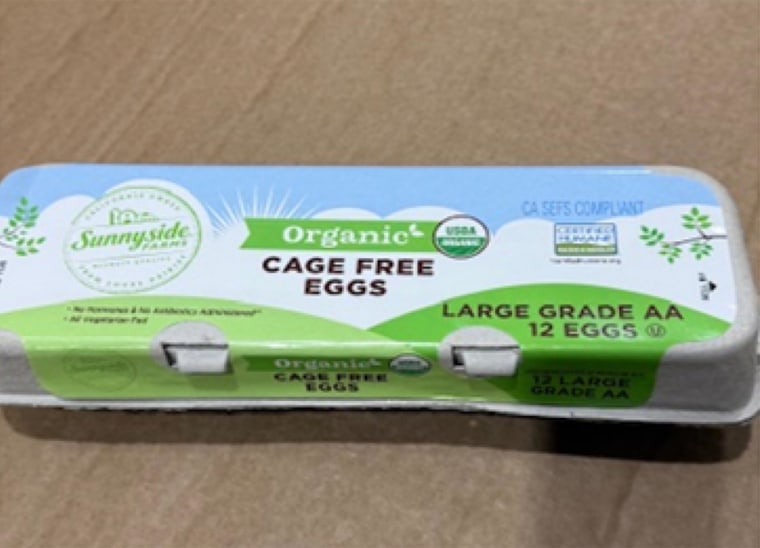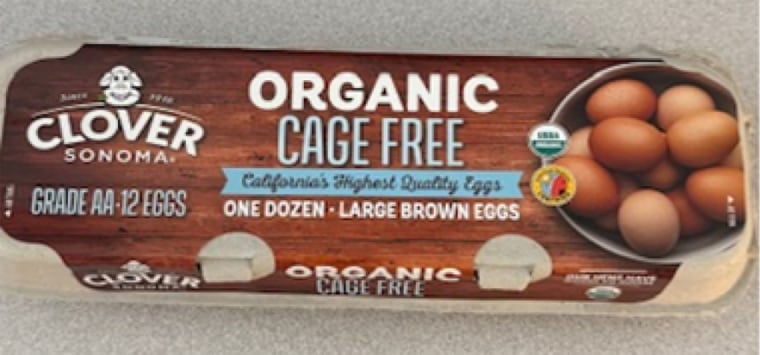In early June 2025, the U.S. Food and Drug Administration (FDA) issued a major public health alert regarding a nationwide recall of approximately 1.7 million dozen eggs distributed by California-based August Farms Egg Company. The decision came after federal health agencies linked a multi-state Salmonella outbreak to eggs sold under numerous brand names in retail stores across the United States.
The recall is in response to 79 reported illnesses and 21 hospitalizations traced back to contaminated eggs. While no deaths have been confirmed, authorities urge consumers to check their egg cartons and dispose of or return any affected products.

Recalled Egg Details
The affected eggs are brown, cage-free, and certified organic. They were distributed across nine states: California, Nevada, Arizona, New Mexico, Washington, Wyoming, Illinois, Indiana, and Nebraska.
Consumers can identify the recalled eggs using the following information:
- Plant Codes: P-5622 or CA-5330
- Julian Dates: 032 through 126 (these represent the packaging dates and can be found on the short side of the egg carton)
The eggs were sold under 29 different brands, including Raley’s, Simple Truth, Sun Harvest, Clover, O Organics, Marketside, and others. According to Simply Recipes, the distribution occurred between February 3 and May 15, 2025, depending on the retailer and location.

Health Risks Associated with Salmonella
Salmonella is a bacterial infection that affects the intestines and can lead to severe illness, particularly in young children, elderly adults, pregnant individuals, and those with weakened immune systems. According to the Centers for Disease Control and Prevention (CDC), Salmonella is responsible for around 1.35 million infections and 420 deaths in the U.S. each year.

Common Symptoms:
- Diarrhea
- Abdominal cramps
- Nausea and vomiting
- Fever
- Headache
- In severe cases: dehydration, bloodstream infections, and hospitalization
Symptoms usually appear 6 to 72 hours after exposure and may last up to a week. Most people recover without medical intervention, but complications can occur, particularly in vulnerable populations.
How the Contamination Was Discovered
The recall was prompted by an investigation in which 27 out of 30 affected patients reported consuming eggs prior to falling ill. During inspections, Salmonella enteritidis was found at the egg processing facility operated by August Farms Egg Company.
According to the FDA recall notice, environmental testing confirmed that the bacteria found at the facility matched the strain that caused the outbreak.
Contamination can occur:
- Internally, when bacteria infect the hen’s ovaries and are passed into the egg during formation.
- Externally, when fecal matter comes into contact with the eggshell and penetrates microscopic pores.
:max_bytes(150000):strip_icc():format(webp)/Copyofrecall-template-purple15-2c0eb726d1ab457ca1df147517fb0a47.png)
Geographic and Retail Scope
The recalled eggs were distributed through both national and regional retailers, including:
- Walmart (sold under the Marketside brand)
- Raley’s
- Safeway
- FoodMaxx
- Smart & Final
- Save Mart
- Food 4 Less
- Lucky
- And other grocery chains in the affected states
According to Health.com, eggs were sold in stores with sell-by dates ranging from March 4 to June 19, 2025.
What Consumers Should Do
Consumers who have purchased any of the affected products should:
- Check the plant code and Julian date on the side of the carton
- Discard the eggs immediately or return them to the place of purchase for a full refund
- Wash hands and disinfect any surfaces or utensils that may have come into contact with the raw eggs
These steps are critical because, as noted by the Associated Press, salmonella can remain on surfaces and be transferred through touch, increasing the risk of household transmission.
Cooking Eggs Safely
It’s important to note that properly cooking eggs can kill Salmonella bacteria. The USDA and CDC recommend:
- Cooking eggs until both the yolk and white are firm
- Avoiding raw or undercooked preparations such as sunny-side up, poached, or soft-boiled eggs unless they are pasteurized
- Using a thermometer to ensure internal temperatures reach at least 160°F (71°C)
According to CDC guidelines, cross-contamination during food preparation is also a common source of infection, so it’s essential to wash hands, cutting boards, and utensils after handling raw eggs.

What Is Being Done to Prevent Future Outbreaks?
Since the recall announcement, August Farms Egg Company has suspended shell egg distribution and is now diverting production to pasteurization facilities, where eggs are processed to eliminate bacteria. The FDA continues to monitor the facility and work with the CDC to trace the full scope of the outbreak.
The company is also conducting an internal food safety review to identify any lapses in sanitation or equipment maintenance that may have allowed the bacteria to spread.
Conclusion
This egg recall serves as a stark reminder of the importance of food safety regulations, proper food handling, and consumer awareness. While Salmonella infections are generally treatable, they can pose serious health risks—especially when products are consumed raw or undercooked.
Consumers are urged to take immediate action by checking their egg cartons for:
- Plant codes P-5622 or CA-5330
- Julian Dates 032 through 126
If found, the eggs should be discarded or returned, and any surfaces that came into contact with them should be sanitized.
Sources
- FDA Recall Announcement – August Farms Egg Company
- CDC – Salmonella Information
- Health.com – 1.7 Million Dozen Eggs Recalled
- Simply Recipes – Salmonella Egg Recall June 2025
- Associated Press – Egg Recall Across 7 States

